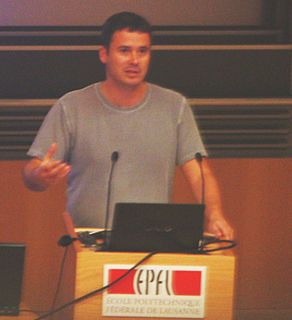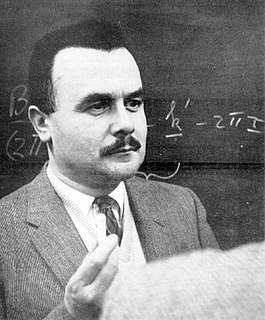Ein Zitat von James Bryant Conant
Ich wage es, Wissenschaft als eine Reihe miteinander verbundener Konzepte und konzeptioneller Schemata zu definieren, die aus Experimenten und Beobachtungen entstehen und zu weiteren Experimenten und Beobachtungen führen. Der Test einer wissenschaftlichen Theorie ist meines Erachtens ihre Fruchtbarkeit.
Verwandte Zitate
Wissenschaft ist ein dynamisches Unterfangen, das darauf abzielt, den Grad des Empirismus bei der Lösung von Problemen zu senken. oder, wenn Sie es vorziehen, Wissenschaft ist ein Prozess der Herstellung eines Netzes miteinander verbundener Konzepte und konzeptioneller Schemata, die aus Experimenten und Beobachtungen entstehen und zu weiteren Experimenten und Beobachtungen führen.
Laplace betrachtet die Astronomie als eine Beobachtungswissenschaft, da wir nur die Bewegungen der Planeten beobachten können; Wir können sie tatsächlich nicht erreichen, um ihren Kurs zu ändern und mit ihnen zu experimentieren. „Auf der Erde“, sagte Laplace, „verändern wir Phänomene durch Experimente; am Himmel definieren wir sorgfältig alle Phänomene, die uns durch die Bewegung des Himmels präsentiert werden.“ Manche Ärzte nennen die Medizin eine Wissenschaft der Beobachtungen, weil sie fälschlicherweise glauben, dass Experimente darauf nicht anwendbar seien.
Es stimmt, dass wir uns in der Quantentheorie nicht auf eine strikte Kausalität verlassen können. Aber indem wir die Experimente viele Male wiederholen, können wir schließlich aus den Beobachtungen statistische Verteilungen ableiten, und durch die Wiederholung solcher Experimentreihen können wir zu objektiven Aussagen über diese Verteilungen gelangen.
Männer, die übermäßiges Vertrauen in ihre Theorien oder Ideen haben, sind nicht nur schlecht auf Entdeckungen vorbereitet; Sie machen auch sehr schlechte Beobachtungen. Sie beobachten zwangsläufig mit einer vorgefassten Meinung, und wenn sie ein Experiment planen, können sie in dessen Ergebnissen nur eine Bestätigung ihrer Theorie sehen. Auf diese Weise verfälschen sie die Beobachtung und vernachlässigen oft sehr wichtige Tatsachen, weil sie ihrem Ziel nicht förderlich sind.
Wenn es Beobachtungskonflikte gibt, wenn Experimente nicht wiederholt werden können, ziehen sich Wissenschaftler möglicherweise auf die Untersuchung der verschiedenen spezifischen Beobachtungen zurück, um den Konflikt zu erklären, und verwenden dabei das Konzept der Beobachtung oder einige davon Spezifikation dieses Konzepts.
Das Prinzip der Wissenschaft, die Definition, lautet fast wie folgt: Der Test allen Wissens ist das Experiment. Das Experiment ist der alleinige Richter über die wissenschaftliche „Wahrheit“. Aber was ist die Quelle des Wissens? Woher kommen die Gesetze, die geprüft werden sollen? Das Experiment selbst hilft dabei, diese Gesetze hervorzubringen, in dem Sinne, dass es uns Hinweise gibt. Aber es braucht auch Vorstellungskraft, um aus diesen Hinweisen die großen Verallgemeinerungen zu ziehen – um die wunderbaren, einfachen, aber sehr seltsamen Muster zu erraten, die ihnen allen zugrunde liegen, und dann zu experimentieren, um noch einmal zu überprüfen, ob wir die richtige Vermutung gemacht haben.
Für rein wissenschaftliche oder technische Zwecke ist das alles irrelevant. Sowohl aus pragmatischer Sicht als auch aus religiöser Sicht werden Theorien und Konzepte im Glauben verankert. Aus pragmatischer Sicht kommt es nur darauf an, dass die Theorie wirksam ist, dass sie „funktioniert“ und dass die notwendigen Vorbereitungen und Nebenfragen nicht zu viel Zeit und Mühe kosten. Darüber hinaus bilden Theorie und Konzepte eine Sprache, in der die wissenschaftlichen Sachverhalte formuliert und diskutiert werden können.
































